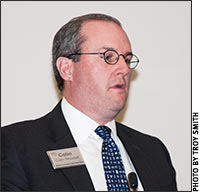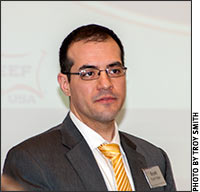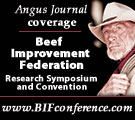Intro to Washington, D.C.
Members of NCBA’s Washington staff outline past, present and future policy issues.
National Cattlemen’s Beef Association (NCBA) staff members from Washington, D.C., offered policy updates to cattlemen and women gathered in San Diego, Calif., for the Cattle Industry Convention & NCBA Trade Show Jan. 28.
Colin Woodall, vice president of government affairs; Kristina Butts, senior executive director of government affairs; Kent Bacus, executive director of legislative affairs; Scott Yager, environmental counsel for NCBA; and Ethan Lane, executive director of the Public Lands Council (PLC), led discussions.

Colin Woodall broke down the Omnibus Appropriations Bill, which included “a lot of tremendous victories for us in the cattle industry,” he said.
Woodall broke down the Omnibus Appropriations Bill, which included “a lot of tremendous victories for us in the cattle industry,” he said.
The bill included reform to the 2015 Dietary Guidelines for Americans.
“We knew this was the first time an advisory committee had gone this far to include topics outside of nutrition and health,” Butts said. Thanks to bipartisan support in Washington, lean meat remains an important part of an American’s healthy diet.
The omnibus brought significant wins for the industry on the fronts of foreign animal disease and tax reform.
On the highly debated Waters of the United States (WOTUS) front, Scott Yager, environmental counsel for NCBA, said Congress failed to pass anything to stop the rule.
The Resource Conservation and Recovery Act (RCRA), enacted in the 1970s, was intended to regulate solid waste landfills. However, Yager said the act is being used to reprimand a group of dairies for allowing phosphorus and nitrogen to seep below the root zone.

The Obama administration is requiring even more strict regulation of the Clean Air Act, making it increasingly difficult for the use of farming and ranching equipment to stay within the act’s bounds.
The Obama administration is requiring even more strict regulation of the Clean Air Act, making it increasingly difficult for the use of farming and ranching equipment to stay within the act’s bounds.
“This has the potential to impact agriculture in the countryside, and we need to make sure that doesn’t happen,” Yager said.
The PLC secured a one-year prohibition listing the sage grouse under protection of the Endangered Species Act (ESA).
Lane said the Council continues to stress to the agencies in Washington, D.C., the frustration that ranchers and landowners have with the Resource Management Plans (RMPs), which the Forest Service and the Bureau of Land Management (BLM) claim protect species outside the ESA. The prescriptive RMPs are threatening to become a “new normal,” which Lane said is unacceptable.
Bacus wrapped up the D.C. discussion with the Trans-Pacific Partnership (TPP).
The TPP is a multi-lateral trade agreement between the Pacific Rim countries, the United States, and some of the largest trading allies of the United States, including Australia, New Zealand, Canada, Mexico and Japan.
For greater detail on these policy issues and updates, read the full story, “Washington Insider,” on page 296 of the March 2016 Angus Journal.

Editor’s Note: This article was written as part of Angus Media’s online coverage of the Cattle Industry Convention & NCBA Trade Show. For additional coverage, visit the Newsroom at www.4cattlemen.com.






